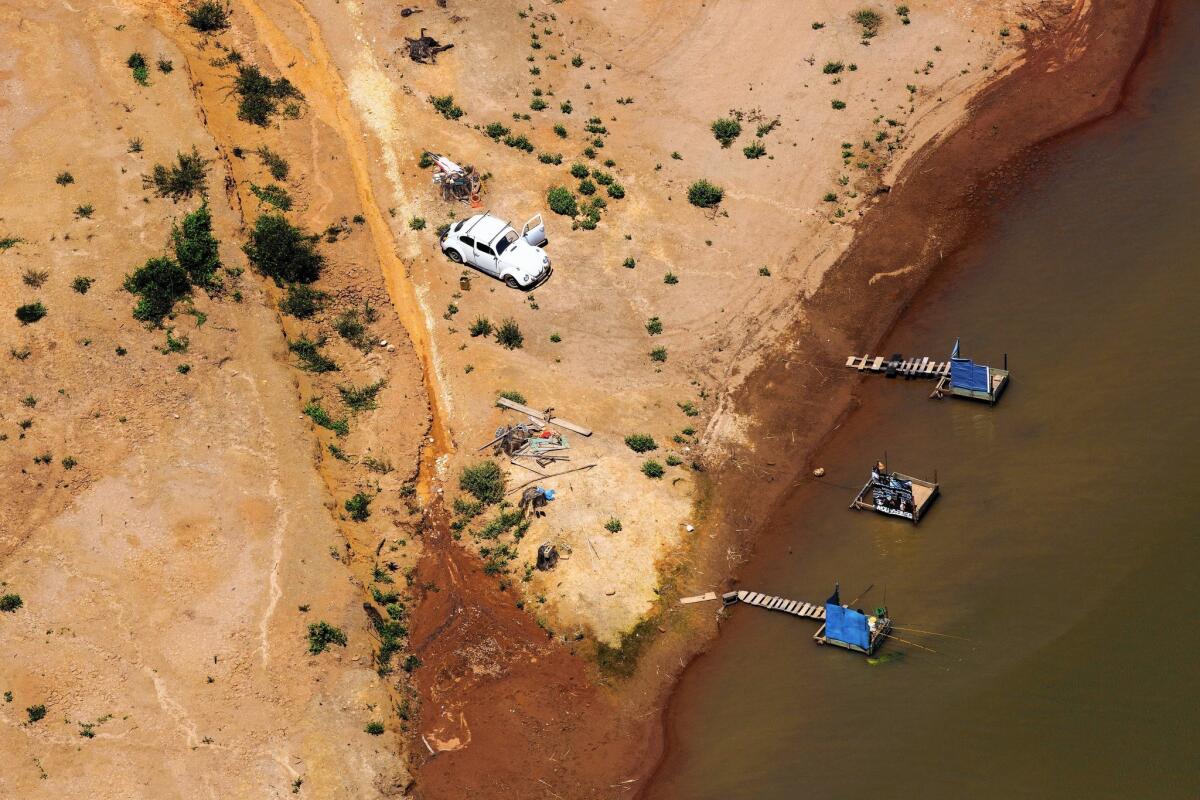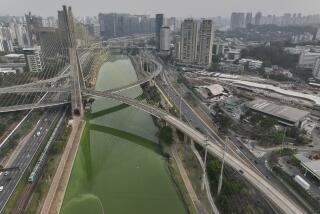Drought drives water shortage to critical stage in Sao Paulo, Brazil

Atibainha dam, part of the Cantareira reservoir, one of the main water suppliers in Sao Paulo state. The reservoir is below 17% of capacity.
- Share via
Reporting from Sao Paulo, Brazil — Officials in Sao Paulo state have announced that the water shortage in the city of the same name is now “critical,” with multimillion-dollar emergency construction projects so far failing to ease the situation.
The announcement was the first time the state government officially recognized the severity of the water crisis and permits the suspension of licenses that allow agriculture, industry and other private concerns to draw directly from area water supplies.
The statement, issued Tuesday, comes at the height of Brazil’s dry season, with water levels in Sao Paulo city’s two main reservoirs extremely low. The Cantareira reservoir is below 17% of capacity; the Alto Tiete reservoir, which at this point in 2013 was at 60.9% of capacity, is at just 15.4%.
Southeastern Brazil is facing its worst drought in more than 80 years. The city of Sao Paulo, which usually averages a scant-enough 1.4 inches of rain in August, has had scarcely a trace this month. It is the largest city in South America, with a population of about 20 million.
Intended as quick fixes to a problem that critics say has been brewing for years, civil engineering emergency “mega-projects” undertaken by the Sao Paulo state government have run into problems, exacerbating the situation and helping to trigger this week’s announcement.
The first project, at a cost of $8.3 million, was inaugurated June 29 by Gov. Geraldo Alckmin and connects the River Guaio to the Taiacupeba Reservoir via a pipeline intended to carry about 265 gallons of water a second into Sao Paulo city’s water supply. But the pumps have been idle because of insufficient flow in the small river as a result of dry weather.
Another megaproject, the largest underway, is expected to carry water from Billings Reservoir into the Alto Tiete system via a nearly 7-mile pipeline. Originally scheduled to begin operation in May, work on the $37.4-million project didn’t start until May 4, with its launch date first pushed back to August and then to October.
The “critical situation” statement says that “special measures should be taken to secure the availability of water in a safe and efficient manner.” That opens the way for the possible suspension of licenses that authorize businesses, agricultural enterprises and private entities to draw directly from Sao Paulo’s rivers and reservoirs and groundwater via artesian wells.
The announcement was “overdue” and “incomplete” and also may pave the way for water rationing, Ricardo Manuel Castro, an official with the state public prosecutor’s office, told Brazil’s G1 news network. The state government has tried to avoid formal rationing, despite unofficial rationing that leaves hundreds of thousands of Sao Paulo residents without water for hours each day, and in some cases for days on end.
Last week, a report published by the Sao Paulo state audit office called the water shortage a result of “lack of planning in state hydric resources,” stating that if warning signs evident as long ago as 2004 had been heeded, the crisis could have been averted or minimized.
The audit office called on the state government to publish an official contingency plan, which had been expected in April, following the state’s first and only crisis meeting on the water shortage held in February. The mayors of 39 municipalities in Sao Paulo city’s metropolitan region, including Sao Paulo’s Fernando Haddad, have also pressed for a contingency plan, which would allow them to take legal measures to mitigate the water shortage.
At a news conference in July, Gov. Alckmin said that the plan would be delivered but that it was unnecessary, calling it “useless paperwork; it’s a waste of public money, since no contingency will be needed.”
Rigby is a special correspondent.
More to Read
Sign up for Essential California
The most important California stories and recommendations in your inbox every morning.
You may occasionally receive promotional content from the Los Angeles Times.













